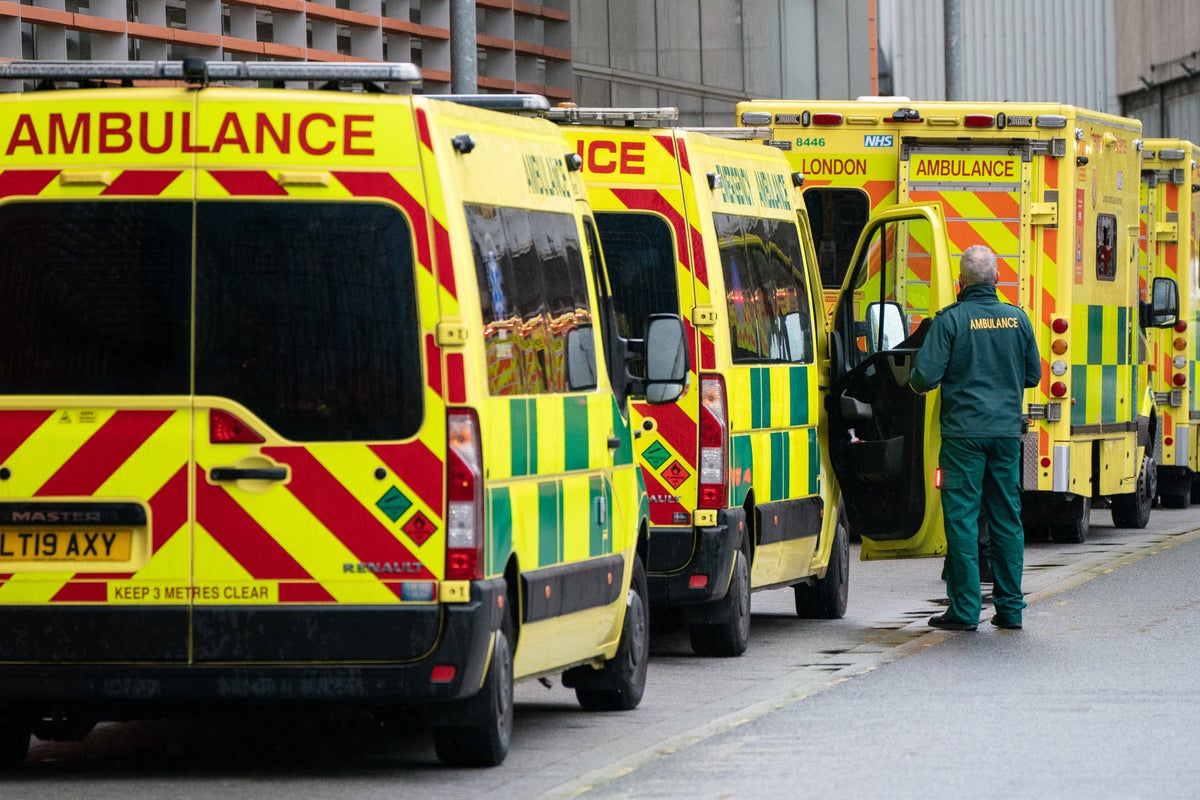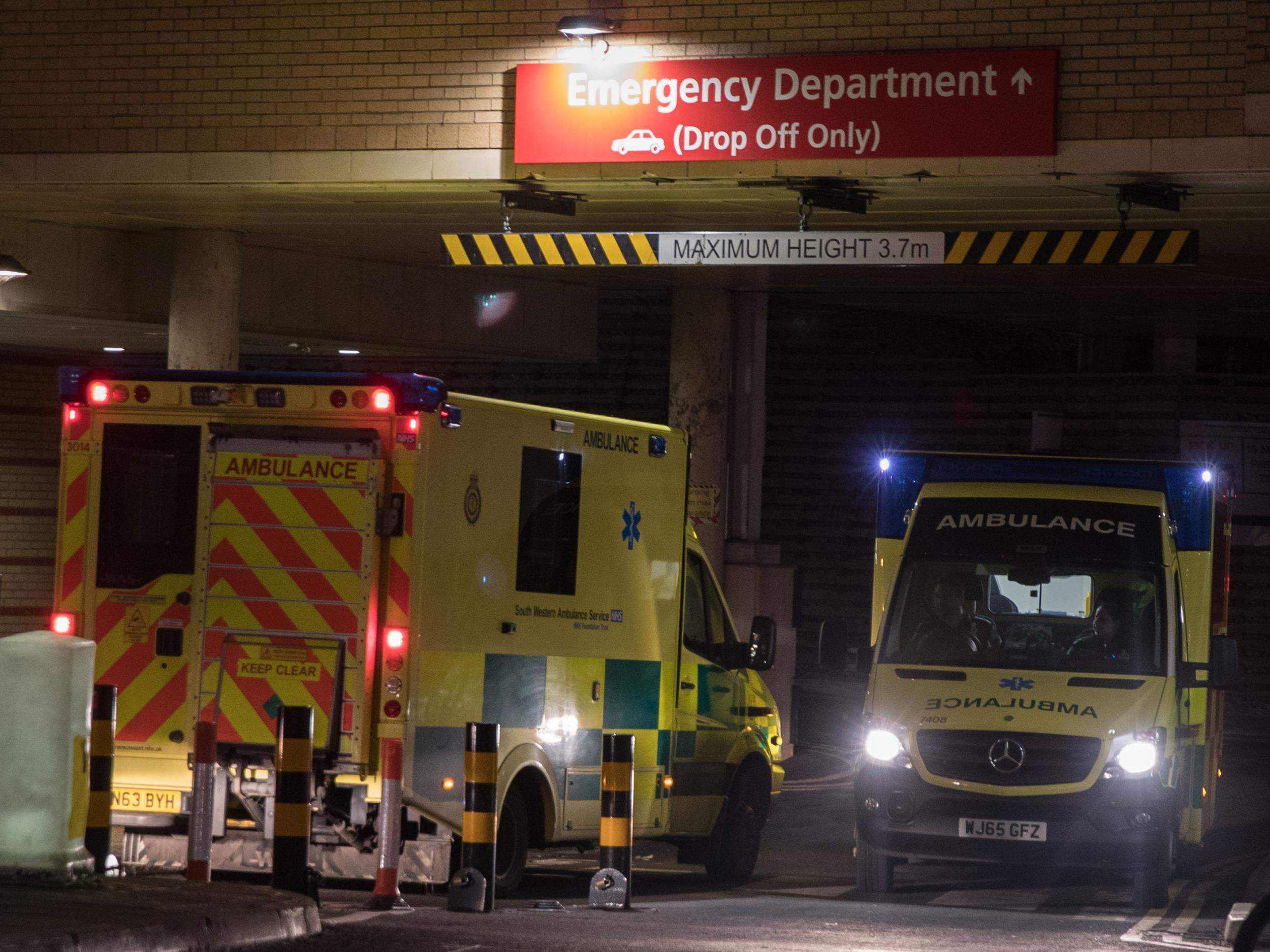
Hospitals “desperate” to free up beds could be putting patients in danger, The Independent has been told.
NHS trusts are being forced into “risky behaviours” in the push to free up hospital beds and A&E departments, experts have warned.
It comes as new data reveals that waits for ambulance crews outside hospitals hit 26 hours in September, with more than 4,000 patients likely to have experienced severe harm due to delays.
In documents leaked to The Independent, hospital leaders in Cornwall warned staff that current pressures in its emergency care system combined with ambulance delays have “tragically resulted in deaths”.
Royal Cornwall Hospitals Trust and the Cornwall Partnership NHS Foundation Trust said in the document that ambulance delays and waits in A&E were causing a “risk to life”, and that as a result they were planning to begin discharging patients into the care of the voluntary sector.
Have you been affected by the issues in this story? Email rebecca.thomas@independent.co.uk
The document said: “It is likely that the risk of such support not meeting all the patients’ individual requirements is less than the risk to life currently experienced in the community when there are significant handover delays at the hospital front doors.”
It comes as North West Ambulance Service launched an investigation after a patient died waiting in the back of an ambulance outside A&E, the Manchester Evening News reported.
In response to worsening A&E and ambulance waits, NHS England has called on trusts to speed up the discharge of patients, with more than 10,000 patients who should be discharged stuck in hospital each day.
Hospitals across the country have begun using a model in which patients are being moved out of A&E every two hours regardless of the amount of space available on trust wards.
Fears have been raised that this model will result in patients being crowded into wards, or the “boarding” of patients, which means that patients are not being placed in the correct type of ward.
Dr Louella Vaughan, an acute physician in London and senior policy fellow for the Nuffield Trust, warned that the evidence shows “boarding” increases the risk of death by 2 to 4 per cent.

Speaking to The Independent, she said the national policy encouraging a move to these models was potentially forcing trusts into “risky behaviours”.
She said: “Every year, we have a flurry of ‘Oh my God, this is going be the worst winter ever’; every year, NHS England rolls out a suite of things which hospitals are expected to do quickly, without any resources and with no time.”
She said the policies do not address the “underlying structural problems with recruitment, and retention, and capacity, and models of care”.
Dr Vaughan added: “The optics at the moment, that we’re seeing people lying on the pavement for six to eight hours with a makeshift tent ... that is dreadful. That does need to be fixed, but overstretching nursing care on a ward can result in elderly patients lying in their own urine and faeces, and not getting the medications, not having drinks of water. They die, too. They just don’t die in the public eye.
“It’ll be 10 years next year since the Francis report [ into the Mid Staffordshire Hospital NHS Foundation Trust]. That showed neglect in nursing through stretched nursing services, and it’s not the nurse’s fault. I’m very worried that might happen with a forced flow model, when the underlying structural problems about lack of social care are not fixed.”
On Thursday the Care Quality Commission warned that a “gridlock” in health and social care was putting patients at risk, as capacity and staffing in social care have left it unable to meet demands.
Doctors across the country have told The Independent that A&E departments are “still overflowing with lots of fit-for-discharge patients blocking flow”.
One A&E doctor said: “I’ve never seen anything like this, but [it’s] not surprising. Everyone feels exhausted and frustrated.”
Another doctor in Newcastle said: “We are desperate for discharges – it’s so hard to get frail elderly [patients] out of hospital now. I think we are at about 100 [patients with] delayed transfers of care.”
‘A risk to life’
Documents leaked to The Independent revealed that the Royal Cornwall Hospital Trust and the Cornwall Partnership NHS Foundation Trust told staff in September: “The health and social care system is currently beyond capacity, with an extreme risk held with the South Western Ambulance Service and in the region’s emergency departments.
“This is resulting in a risk to life, with increasingly extended wait times for a category 2 ambulance response and handover delays at the front door of both Royal Cornwall Hospital and University Hospital Plymouth. There is current evidence that this risk to life has tragically resulted in death.”
National data shows that ambulance response times in the South West were the worst of any area last month, with category 2 patients, the second most urgent cases, waiting 2 hours and 25 minutes for an ambulance response. These patients include those who are suspected to be suffering from strokes and heart attacks.
The document sets out plans to tackle the problem of patients being stuck in hospitals by discharging them into the care of the voluntary sector.
Speaking to The Independent, Professor Alison Leary, an independent healthcare consultant and a researcher at London South Bank University, said: “This is a place of desperation, I agree. This is a high-risk scenario. With a lot of unknowns, it [would] be better to understand how they are mitigating those risks.”
She added: “There are things in this [document] where they refer to ringing people to ensure they haven’t fallen. If people are at that sort of level of risk, where they need carers, and that resource isn’t available, then that is obviously exposing people to risk.”
One senior staff member at one of the trusts said: “Where the patient’s need is well articulated and they can be matched with an appropriate volunteer, it can work well – say help with meal prep or shopping. But to think it is a magic bullet for all domiciliary care gaps seems optimistic at best.”
A spokesperson for the two South West hospitals said the voluntary sector had been involved in discharges for “a long time”.
They said the patients being discharged “don’t have clinical needs”, adding: “This service helps resettle people home after a hospital stay, and if they require assessment for any ongoing re-enablement needs, which is in line with national guidance relating to discharge to assess.
“The voluntary sector in Cornwall and the Isles of Scilly has a long tradition of supporting people who can be discharged from hospital but who need some support back at home.
“We are now helping this much-valued work by funding it as a sustainable service from Disability Cornwall and Age UK. Examples of the ways they are supporting people at home include making sure they have shopping in, heating on, and [providing] support with enablement for a few weeks.”
A spokesperson for NHS England said: “Working closely with local leaders, the NHS agreed a set of measures to help frontline staff, including 24/7 control centres, falls response services, additional beds and extra call handlers – all of which are aimed at increasing capacity and reducing pressure on hospitals ahead of what is likely to be a very challenging winter.
“The NHS is constantly monitoring a range of measures being used across the country that help improve patient flow and support staff, so that they can be easily shared and adopted by other hospitals where clinically appropriate.”







